"The Christmas period is always busy for Kapiris Bros, and the company is preparing for its first harvest of gourmet tomatoes for the 2024/25 summer season from Two Wells, although the harvest will be delayed due to the impact of ToBRFV. In the meantime, the company will source gourmet tomatoes from a partner grower in Victoria to meet demand. "Gourmet tomatoes are highly versatile and in high demand during Christmas. They can be used in a wide range of dishes," Nick Papatheodorou of Kapiris Bros says. "We believe that gourmet tomatoes are the star of the Christmas season."
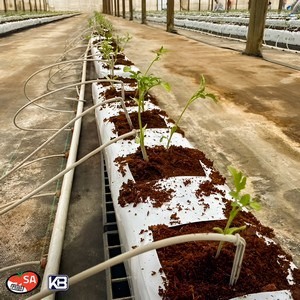 A shift in seasons
A shift in seasons
"A significant challenge for us is the seasonal transition between regions," Nick explains. "As temperatures rise, we shift our focus from Bowen to Two Wells."
However, this year, a new challenge arose with the detection of Tomato Brown Rugose Fruit Virus (ToBRFV) in South Australia's Northern Adelaide Plains.
This virus affects both tomatoes and capsicums, leading to strict quarantine measures and economic losses for many growers.
"The detection of ToBRFV has been a major challenge, particularly as we head into the 2024/25 growing season," Nick explains. "We are working closely with partners to adapt and implement biosecurity measures to mitigate further risks."
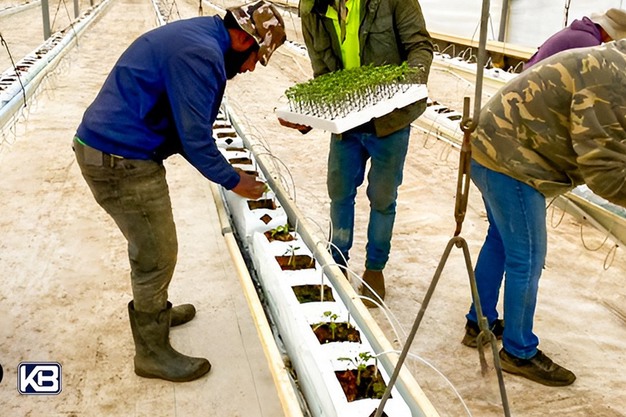
Two Wells Greenhouse
Techniques in cultivation
In Two Wells, the company uses high-density planting in hydroponic greenhouses for gourmet and roma tomatoes. "Our tomatoes are grown in cocopeat media and irrigated with drip systems. This method, combined with disease-resistant varieties, helps us to optimize productivity and reduce risks," Nick shares. "The high-density planting method also allows for efficient crop management."
In Devonport, Tasmania, Kapiris Bros uses Dutch glasshouse technology for capsicum production. "The glasshouses feature climate control systems and irrigation controls to optimize growing conditions." The farm operates with a hybrid organic and nutrient-recirculating system, reducing water waste and minimizing environmental impact. "Our Devonport operation is focused on sustainability, with recirculating hydroponic systems that use 100% of the water for growing," Nick explains.
The Bowen farm employs outdoor field farming techniques. "Over here our tomato plants are trellised with steel stakes and string, and irrigation tape is laid using a tractor. Our Bowen farm focuses on outdoor gourmet and roma tomato production. We use a hands-on approach to manage the plants, pruning and 'haircutting' them to ensure optimal growth," Nick says.
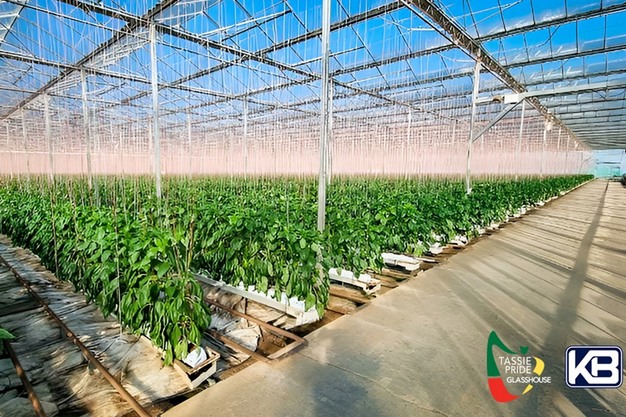
Devonport Greenhouse, Tasmania
The economy and its trends
Nick notes that technologies like satellite monitoring and blockchain are becoming all the more important to improving traceability and quality assurance in farming and supply chains. "These technologies are becoming increasingly important for our domestic customers, including large retail supermarket chains and national restaurant chains," he says.
Economic pressures remain a concern, as rising costs for energy, water, and labor continue to affect Australian growers. "You can see the cost of living being reflected in consumer purchasing habits. While sustainable and locally grown produce remains important, there is a stronger demand for cost-effective fresh produce," Nick explains.
Embracing automation
Labor shortages are a persistent challenge in agriculture, especially during peak harvest times. "We work with third-party labor hire companies to manage seasonal labor fluctuations. They help us manage workforce demand without the administrative burden of direct employment," says Nick. However, attracting workers remains difficult, especially for younger Australians. To overcome this in their operations, Kapiris Bros has adopted automation technologies, such as automated grading equipment for precise sorting of produce. "Automation is costly, but it helps us maintain efficiency and reduce our reliance on manual labor," Nick explains.
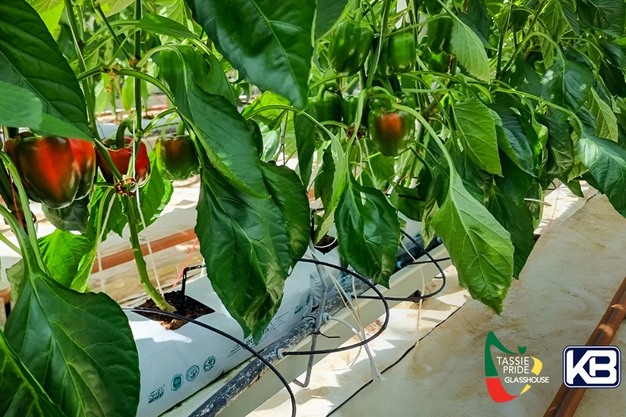
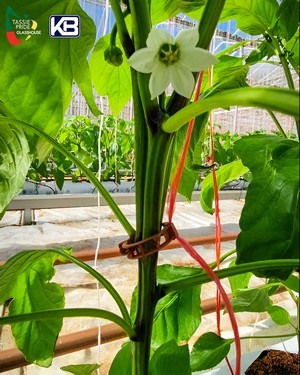 A family affair
A family affair
Founded by three brothers in Two Wells, South Australia, Kapiris Bros started as a tomato-growing operation on a 30-hectare property. Over time, it expanded its operations to include a wider range of produce, with tomato and capsicum production now spanning multiple regions across the country.
The company was officially formed in 1958 when John Kapiris moved to Victoria to focus on growing and marketing tomatoes. After his retirement in 1986, management was passed on to five of his children. The third generation of the Kapiris family continues to run the business today. "We've built a strong foundation over the years, and the third generation of the Kapiris family is now heavily involved in managing all aspects of the business," says Nick.
Kapiris Bros partners with the Eatough family in Bowen, Queensland, to grow gourmet and roma tomatoes during winter and with the Joubert family in Devonport, Tasmania, to grow glasshouse capsicums in summer and autumn. The company also maintains its original farm in Two Wells, producing hydroponic tomatoes during the summer and autumn. "Kapiris Bros has developed a strong supply base by partnering with growers in North Queensland, Western Australia, South Australia, Tasmania, and Victoria, which allows us to maintain a consistent supply of tomatoes and capsicums year-round," Nick adds.
For more information:![]()
Nick Papatheodorou
Kapiris Bros
Tel.: +61 3 9689 6711
[email protected]
www.kapirisbros.com.au
